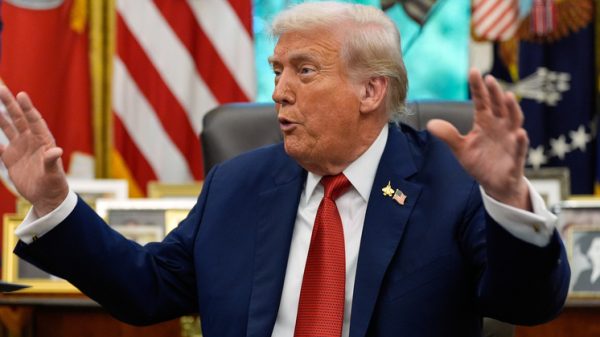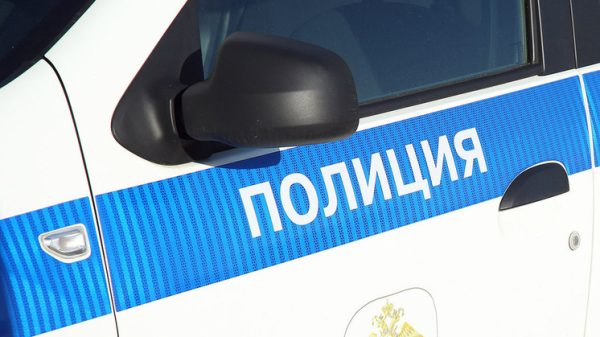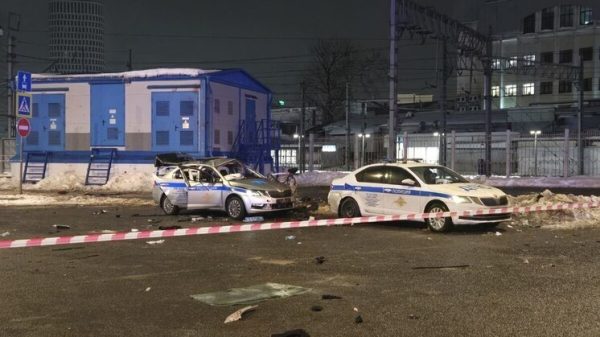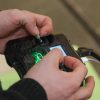Mopti used to be a stopover for tourists on their way to the fabled Timbuktu, or to see the homes of the Dogon people cut into the yellow cliffs of Bandiagara. The Malian city, which is known for its grand mosque and rock-salt markets, lies where the Niger and Bani rivers meet. When the rivers flood, the town is turned into a series of islands.
But the visitors and their cameras are gone, and the 4x4s that used to transport them replaced with those bearing logos of humanitarian organisations, as the Mali government struggles to root out a strengthening Islamist movement that has been expanding from the north of the country since 2015.
‘A drastic loss’: Satellite imagery reveals Mali’s farmers forced off land by militias
Read more
Khadija Hamadoun Diallo, a Fulani farmer, is sitting on a plastic mat, a red and black veil loosely covering her hair, in the shade of a white tent on the edge of Mopti. She has been living with her children in the camp for displaced people for about four months. Some have been there several years. More come every week, she says, all praying for the return of peace and security.
“First, soldiers came to search our homes, and made a few arrests in the village. Then they returned a month later. They appeared out of nowhere on pickup cars. And they started shooting.
“With the help of the Dozo, they burned down our houses,” says Diallo. “Now we have nothing left there.”
The Dozo are traditional hunting fraternities that have formed self-defence militias that the Fulani say are being armed by the Mali army and used to carry out attacks on them. During one raid in June 2018, Dozo men surrounded a village in the Mopti region, separated those from the Fulani ethnic group from other villagers and killed 32 people, targeting them because of their perceived support for jihadists.
Islamist militants first established themselves in the rural areas of the central region more than 10 years ago, and began launching sporadic attacks on police stations, elected officials and religious leaders who spoke out against them from 2012. They grew in daring and violence, causing heavy losses among the Malian security forces. Civilians who lived in their area of control suddenly found themselves subject to unofficial new laws, imposed by the jihadists.
Areas of conflict in Mali’s jihadist insurgency
Areas of conflict in Mali’s jihadist insurgency
Amadou Koufa, a radical Fulani preacher, was the founder and leader of the Macina Liberation Front, which merged with other militant Islamist groups to form Jama’a Nusrat ul-Islam wa al-Muslimin (JNIM). This pledged allegiance to al-Qaida and became a leader of the jihadist group’s local “franchise”, the Organisation of al-Qaida in the Islamic Maghreb (the Isis equivalent is the Islamic State in the Greater Sahara, or ISGS). Koufa is behind dozens of attacks on Malian armed forces, taking part in the assault on the city of Konna in 2013, when the Islamist militants’ push south in Mali drew the French into the insurgency.
Koufa, who is on the UN’s sanctions list for his links to al-Qaida, recruits among young herders by exploiting feelings of exclusion and the lack of economic opportunities in the region. Villagers watched their young men become transformed into fighters under his influence.
“I’ve seen friends who left the village and came back with some money, sometimes a motorbike,” says a man in his 30s, who asked not to be named. Originally from the Mondoro area of the Mopti region, in central Mali, near the border with Burkina Faso, he now lives in a shelter on a landfill site in the capital, Bamako, where Fulani herdsmen and their families set up a slum camp after fleeing the violence.
“At the time, I was living with my mother and younger brother. We had no cattle of our own, we were working as herders for others. I thought joining the jihadis was an opportunity for a new start,” he says.
But the allure of a new cause, and a little money, did not last long. Only three months later, he was beaten up by his puritanical new comrades for smoking a cigarette. He escaped, with a badly broken knee. “I was there for the money, the little things we could get after fighting, or from villagers,” he says. “But others were there for revenge. Against the authorities, or sometimes against a neighbour with whom they had a disagreement. The jihadis can arrest, intimidate or kill who they want.”
Bréma Ely Dicko, a Malian anthropologist, says the crisis has upturned the established order in Mali. “Many among those who joined the armed groups are young men who come from the lower classes of the society – known as ‘prisoners’, or ‘slaves’ in Mali – who are serving the higher castes,” he says.
“Many positions of authority, like the village chiefs, the imams, were hereditary. But now, those who have the power are those who have the weapons.” He says people in the region “are realistic about the fact that the state is not going to retake control soon. So they turn to those who can best give them some form of protection and stability.”
Amarou Gourro Diallo lives along the Niger River in a small flat above a former bank. Like his father and grandfather before him, he is the chief of Nantaka, a big village on the other side of the wide river, where small wooden boats ferry passengers back and forth. “It’s different there,” he says. “It wouldn’t be safe for you to meet me there.”
When he first started to see armed groups roaming around, he was fearful. He remembers how a teenager who wanted to join them was beaten up by his family to teach him a lesson. That was four or five years ago. Since then, many youths have left for what they euphemistically call “the forest”.
Others have learned to live under the yoke of those new lawmakers, who closed schools, banned music, imposed a strict dress code and imposed their own taxes.
“If you obey their rules, they don’t give you problems,” says the chief. “They also collect the zakat, a [religious] tax on your properties, in money or cattle.” What about those who do not pay? He laughs. “You must pay.” But that is no longer his main concern. In 2018 the arrests began.
“The Malian army has caused us more harm. They arrested dozens of Fulani men, whoever they could find. I was among them,” says Diallo. “They released some of us, but took the others away and killed them.” Twenty-five bodies were later uncovered in several mass graves.
“They said they were all terrorists,” he says. “But they were innocent. Some of them were old men, they had nothing to do with that [insurgency]. There has been no justice, to this day.”
Fulani men are automatically perceived as suspects by the Malian army, says Ousmane Dicko, president of the youth wing of Tabital Pulaaku in Mopti, a civil organisation defending Fulani interests.
“There are many disappearances and executions. People have to live by the rules imposed by the jihadis. But they are also harassed, sometimes murdered, by those who are supposed to protect them.”
The Malian authorities’ encouragement of the creation of “self-defence groups” to help in tackling the insurgency has become a major catalyst in the escalation of the conflict.
“Soldiers didn’t know the field well, so the Dogons started guiding them. As a revenge, the jihadis killed Dogon peasants when they were going to the fields, and burned the grain reserves in the villages,” says Enock Sagara, drinking cola in the courtyard of his bar in Sévaré, about six miles from Mopti. He says he is affiliated to these Dozo militias, which are accused of massacres and summary executions of Fulani people. “These are lies,” he says. “We are only defending ourselves.”
In Mali’s war, everyone sees themselves as the victim of the other. “We can’t ignore that the jihadis are supported by their fellow [Fulani] men,” says Sagara. “They hide among them and come out at night to attack. We had accepted the Fulani on our land, but now they are causing us harm. ”
Old rivalries between Fulani herders and Dogon farmers have been exploited by all sides and further aggravated by demographic pressure on the land and the proliferation of guns. The state is generally absent, and religious and community leaders, unable to ensure the safety of their fellow villagers, are losing their authority, making it harder to solve tensions through the traditional and well-respected methods of conflict resolution.
There were more than 1,500 conflict-related deaths recorded in the Mopti region in 2020, the deadliest year since the start of the hostilities, according to Armed Conflict Location & Event Data Project, an organisation that monitors and analyses conflicts.
“This has nothing to do with jihad, or with Islam. What I see are dispossessed people, whose relatives have been killed. They take up arms to demand justice,” says Hamadoun Bolly, 56, who had to leave his village two years ago. He lost dozens of cows and sheep, everything he owned. “When young people go to ‘the forest’ to fight, of course that will make matters worse, but how are we supposed to stop them ?”




















































Свежие комментарии